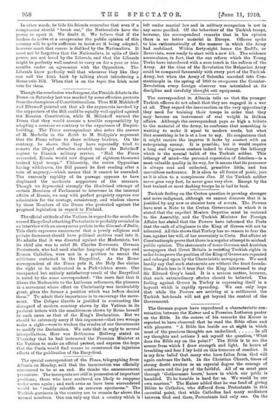The correspondent in Albania tells us that the younger Turkish
officers do not admit that they are engaged in a war at all. They regard the insurrection as the very opportunity they need for training their troops in order that they may become an instrument of real weight in Balkan affairs. Although the correspondent pays so high a tribute to the material of the Army, he confesses that something is wanting to make it equal to modern needs, but what that something is he is at a loss to say. He conjectures that it might receive the impetus it lacks by contact with an enterprising enemy. It is possible ; but it would require a long and vigorous contact indeed to change the lethargy which is the mental habit of the Turkish soldier. This lethargy of mind—the personal expression of fatalism—is a most valuable quality in its way, for it means that its possessor is always cool and collected, grumbles little, and has marvellous endurance. It is alien to all forms of panic, just as it is alien to a conspicuous elan. If the Turkish soldier never goes very fast, he never goes very slow. Except by the beat trained or most dashing troops he is bad to beat.














































 Previous page
Previous page